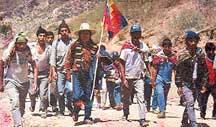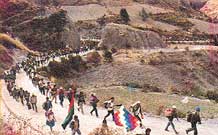The Bolivian Syndicalist Confederation of Colonizers
(CSCB)
AFILIATED WITH THE WORKERS UNION OF BOLIVIA (C.O.B)
FOUNDED FEBRURARY 18 1971
JURIDICAL PERSONALITY R.S. 218425 LA PAZ - BOLIVIA
ADDRRESS:
CALLE MURILL NO. 744
TEL/FAX 591-2-363-023

WHO ARE THE COLONIZERS?
We are Aymaras, Quechuas, Guaranies, Chimanes, Ayoreos and other native peoples (pueblos originarios) that have emigrated from the high peaks of the Andes to subtropical zones in search of better living conditions. We left the highlands because of land scarcity, natural disasters, and the contamination caused by agroindustry.
Many of us migrated to urban zones in search of work but often we found only discrimination and exploitation. In the 1960s, the Bolivian government along with the Alliance for Progress, a U.S government program, sought to put a stop to urban migration and organized new human settlements in the tropical areas of the country. This was called "colonization" and they called us "colonizers" ignoring that we are the millenarian peoples of Kollasuyo, what is now called Bolivia.
Despite promises of food and infrastructure, once we arrived in the lowlands we were abandoned and left to fend for ourselves. More than fifty percent of our people died due to malaria and other diseases. In many cases, we were returning to lands that before the colonial period were part of the ecological systems of Aymaras and Quechuas. It is a tragic irony that we are strangers in our own land.
THE CSCB
The CSCB is the main organization (organización matriz) of the Reconstituted Native Peoples of Bolivia, wrongly called colonizers; it fights for the self-determination of the original nations of Kollasuyo. The CSCB is a revolutionary organization that seeks to unify of the marginalized sectors of society in order to change the current neoliberal system for one more just, equitable, and united; one without exclusion, oppression, and exploitation.
OUR HISTORY

The theft of our land by the Spaniards, Creoles, and dominant classes has always been linked top a racial struggle. The discrimination and hate form part of the colonial heritage of Latin America that continues to oppress us. Throughout history, native peoples have resisted this oppression in various ways. While never forgetting the experiences of our ancestors who revolted against the invading Spanish, since the 1930s we have adopted syndicalism as a means to continue our anti-colonial struggles.
The state has constantly sought to eliminate or co-opt us: they tried after the revolution of 1952 with the docile syndicalism of the National Confederation of Peasants and Workers, then later with the Peasant-Military Pact (PMC). Both the Revolutionary Party ( MNR) and the subsequent military governments thought that they could manipulate peasants and native peoples like puppets. They were wrong. In 1971, the colonizers were the first to break with the PMC and found our own confederation.
Objectives
¨ Represent and defend the interests of our member organizations to achieve the holistic improvement of the old and new human settlements or reconstituted communities in legally recognized lands.
¨ Constantly work toward the unity of members and keep them organized
¨ Cooperate in the processing and organizing of land claims until obtaining land titling, definitive legalization, and their consolidation as settlements with property rights.
¨ Assist in the obtainment of juridical personality of the member federations in the form of Centrals (Centrales) and unions (sindicatos) in order to strengthen them as they work for the collective good.
¨ Prepare and provide leaders with the sufficient technical and theoretical training so that they are able to be able to participate decisively in governmental affairs.
¨ The CSCB aspires to and projects revolutionary goals, and thus must have leaders that are ideologically and politically well-prepared, with the aim of exercising syndical power for the benefit of all members.
¨ Mobilize all members when the CSCB is made the object of controversy by the government, and when it members are marginalized, discriminated against, or made the victims of injustice.
Member Organizations
LA PAZ
Coordinadora Departamental
Federación Agraria Especial de Colonizadores de Alto Beni
Federación Ecológica Sindical de Comunidades Originarias de la Asunta
Federación Agraria Especial de Colonizadores de Caranavi
Federación Provincial de Mujeres Colonizadores de Caranavi
Federación de Comercializadores
Federación de Colonizadores de Alto Beni Km, 3
Federación Agraria Especial de Colonizadores y Comunarios Larecaja Trópical
Federación Agraria Especial de Colonizadores de Taypiplaya
C. Reserva
Bautista Saavedra
Abel Iturralde
Amas de Casa
COCHABAMABA
Federación Sindical de Colonizadores Carrasco Trópical
Federación Sindical de Mujeres Carrasco Trópical
Federación Agraria Especial de Colonizadores de Chimoré
Federación de Mujeres Colonizadores de Chimoré
Federación Especial de Colonizadores de Yungas Chapare
Federación de Colonizadores de Mamore
SANTA CRUZ
Federación Departamental de Santa Cruz
Federación de Santa Cruz
Federación Agraria Especial de Colonizadores de San Julían Norte
Federación de San Julían Sur
TARIJA
Federación Departamental Tarija
Federación Especial de Colonizadores de Bermejo
BENI
Federación Departamental del Beni
Federación Especial de Colonizadores de Yucumo
Federación de Colonizadores Agropecuarios de Rurrenbaque
SUCRE
Federación Departamental de Chuquisaca
Asociación de Colonizadores de Chuquisaca